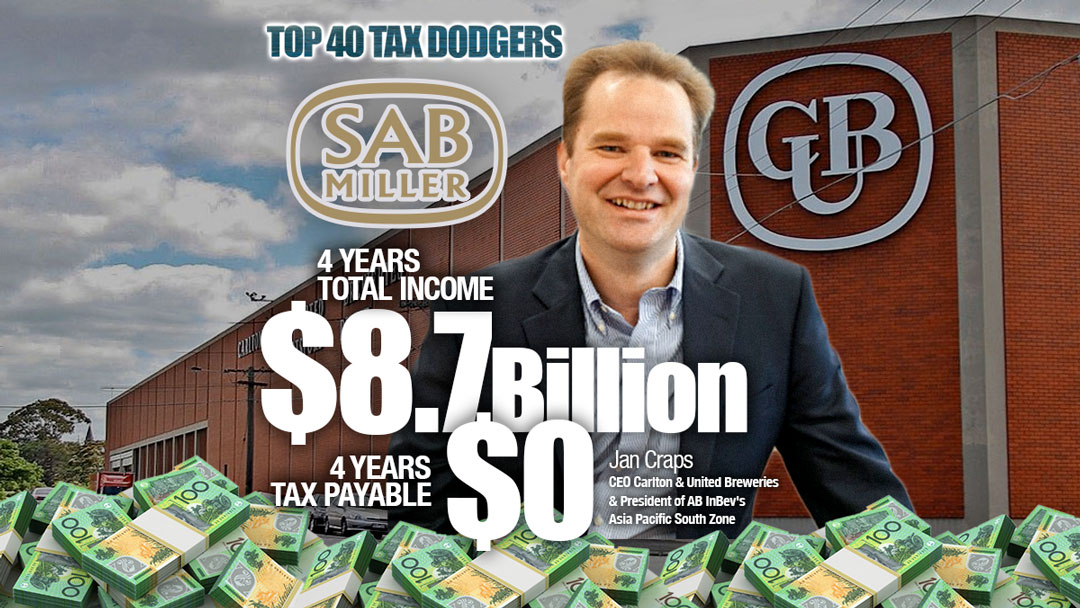SABMiller Australia Pty Ltd
| 4 year total income | $8,720,364,539 |
| 4 year taxable income | $0 |
| Margin | 0.00% |
| 4 year tax payable | $0 |
| Tax Rate | 0.00% |
| Auditor | |
| Industry | |
| Links |
Question: how do you rack up $2.5 billion dollars in losses selling beer to Australians? Selling the likes of VB, Carlton Draught, Pure Blonde, Cascade, Crown Lager; big profitable brands in a big beer-swilling duopoly?
Answer: you engineer a corporate takeover and billions of paper losses and get PwC to sign off on your accounts.
And what a useless set of accounts they are: “A small proprietary company,” we are told, or rather ASIC is told. The Tax Office was told this so-called small company has flogged almost $9 billion worth of grog over the past four years.
Its accounts are not even consolidated so you can’t see the $2 billion-plus in annual sales, just revenue of $57 million and a profit of $57 million last year (yes, the same number apparently), and then a tax benefit of $75 million too to produce a bottom line of $132 million last year, yes from stated revenue of $57 million .
Originally called Foster’s, CUB was taken over by US brewer SABMiller which was in turn taken over by Belgian giant Anheuser-Busch InBev in 2016.
Among the other, few, notable features in this cynically shoddy set of accounts is the “derecognition” of $767 million in deferred tax assets, which suggests the new owners have snaffled them to use elsewhere so they won’t have to pay a cent in income tax in Australia for years to come selling Australian beers from Australian breweries to millions of Australians.
Billions in profits will flow, untaxed directly offshore.
Public support is vital so that we can continue to investigate and publish articles that tell truth to power. Subscribe with a monthly contribution if you can, see below. Join our newsletter, share and like posts, if you can not make a financial contribute.
2019 METHODOLOGY
We are counting down the Top 40 Tax Dodgers. There are now four years of tax transparency data published by the Tax Office and we have used this data to work out which large companies operating in Australia have paid the least tax, or no tax.
Notable new economy players such as Google, eBay, Booking.com, Expedia are not near the top of the ATO list. That’s because they don’t (yet) recognise all income earned here; instead, they book Australian revenue directly to their associates offshore. They will be ranked in due course.
For other large corporations, and in particular, multinationals, the main steps in avoiding tax are made by reducing their taxable as much as they can; usually by sending it offshore in interest on loans, “service” fees or other payments to foreign associates. So, we have set a threshold. We have included only those companies which managed to wipe out 99.5 per cent or more of their taxable income over four years.
Qantas, therefore, is not on this list, although it has enormous income and has paid no income tax in Australia for many years. It misses the cut-off due to it not eliminating more than 99.5 per cent of its total income.
The airline had made large losses which were offset against profits. Many large corporations which have paid zero tax in ATO data, have legitimately made losses and have therefore built up “tax-loss shelter”.
Further explanation of methodology can be found here.
Many others however, such as ExxonMobil and EnergyAustralia, are on the list as they managed to eliminate all or most of their taxable income by “debt-loading” or other means of aggressive tax avoidance.
In this, the second iteration of michaelwest.com.au corporate tax rankings, we have ranked companies purely on the Tax Office data. We will also publish a list of Australia’s better corporate taxpayers, those companies who contribute most to the country in which they operate.
The Tax Office data is not a perfect guide. It does not record refunds, only tax payable and is often at odds with disclosures made for accounting purposes. In some cases, there are multiple entities with the same ultimate offshore parent reporting. One entity may pay zero tax, another may pay at the statutory 30 per cent rate (even if on low taxable income). We endeavour to be fair in our reporting to recognise these issues.
The data also recognises trusts as well as companies. For trusts, it is the members (investors) rather than the trusts who are ordinarily required to pay the tax. In many cases however it is fair to recognise trust structures for what they are, as tax is often the main reason these vehicles have been structured as trusts.
Companies are welcome to debate their rankings or to touch base to clarify or defend their tax practices. We will append or link these submissions.
Hydrox has been taken off the list as it never made a profit.
Michael West established Michael West Media in 2016 to focus on journalism of high public interest, particularly the rising power of corporations over democracy. West was formerly a journalist and editor with Fairfax newspapers, a columnist for News Corp and even, once, a stockbroker.

